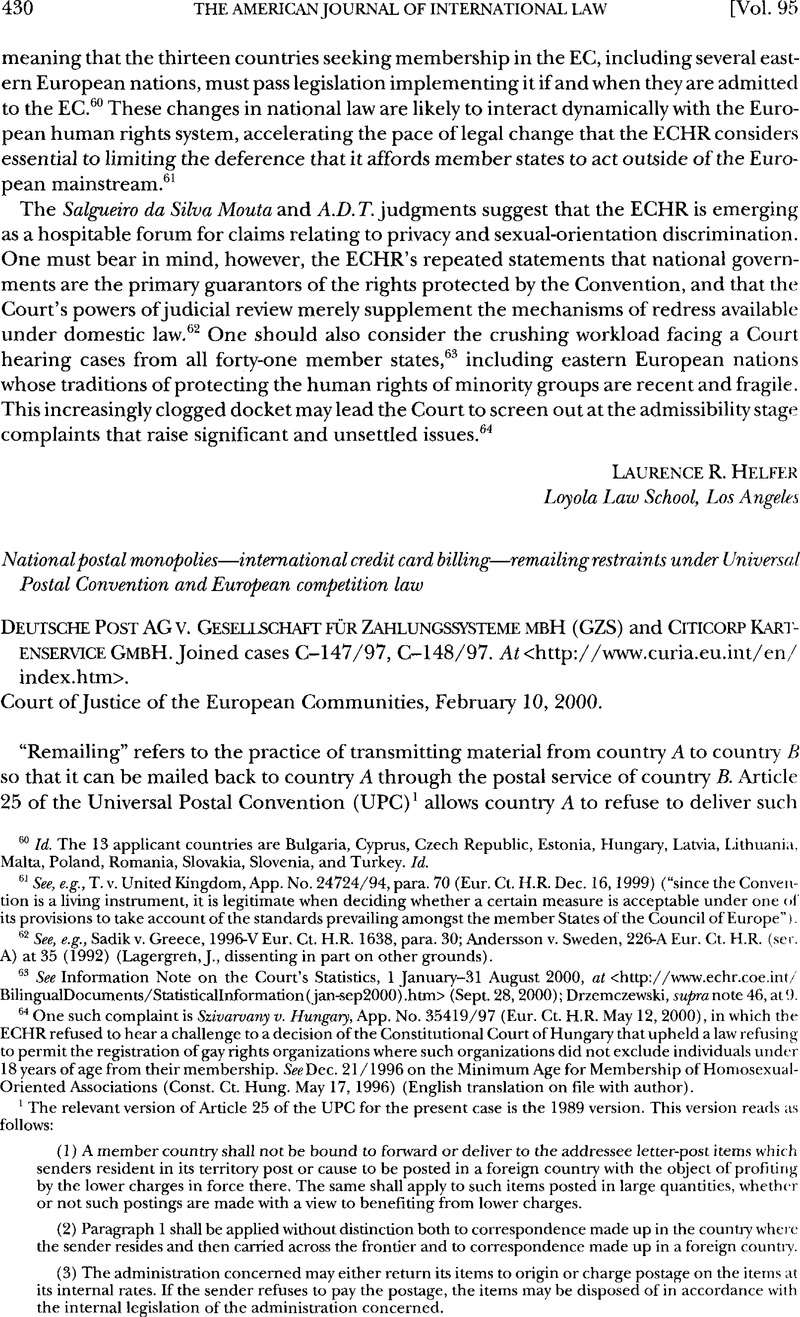No CrossRef data available.
Published online by Cambridge University Press: 27 February 2017

1 The relevant version of Article 25 of the UPC for the present case is the 1989 version. This version reads as follows:
(1) A member country shall not be bound to forward or deliver to the addressee letter-post items which senders resident in its territory post or cause to be posted in a foreign country with the object of profiting by the lower charges in force there. The same shall apply to such items posted in large quantities, whether or not such postings are made with a view to benefiting from lower charges.
(2) Paragraph 1 shall be applied without distinction both to correspondence made up in the country where the sender resides and then carried across the frontier and to correspondence made up in a foreign country.
(3) The administration concerned may either return its items to origin or charge postage on the items at its internal rates. If the sender refuses to pay the postage, the items may be disposed of in accordance with the internal legislation of the administration concerned.
(4) A member country shall not be bound to accept, forward or deliver to the addressees letter-post items which senders post or cause to be posted in large quantities in a country other than the country in which they reside. The administration concerned may send back such items to origin or return them to the senders without repaying the prepaid charge.
In its current 2001 version, Article 25 of the earlier UPC version was shifted to Article 43. Since the ECJ applied the 1989 version, the provision is cited here as Article 25, not Article 43. Besides some technical changes, the 2001 version of the UPC omitted the second sentence of paragraph 1 of the 1989 version, which extended the application of Article 25 to items posted in large quantities without regard to the intent of benefiting from lower charges.
2 Universal Postal Convention, amended by Sixth Additional Protocol to the Constitution of the Universal Postal Union, with General Regulations and the Universal Postal Convention, Sept. 15, 1999, Art. 43(1) (entered into force Jan. 1, 2001), at <http://www.upu.int> under “The UPU and Its Members; UPU Acts” [hereinafter UPC] (visited May 8, 2001).
3 Treaty Establishing the European Community, Mar. 25, 1957, 298 UNTS 11, as amended by Treaty of Amsterdam, Oct. 2, 1997, O.J. (C 340) 1 (1997), reprinted in 37 ILM 56, 82 (1998) [hereinafter EC Treaty].
4 Deutsche Post AG v. Gesellschaft fur Zahlungssysteme mbH (GZS) and Citicorp Kartenservice GmbH [hereinafter Judgment]. Recent ECJ cases and opinions of the advocate general are available online at <http://www.curia.eu.int/en/index.htm>.
5 Another German remailing case is on the ECJ’s docket. In that case, a German subsidiary decided to have all advertisements mailed to its German customers by its Dutch parent. This case was referred to the ECJ by the regional court (Landgericht) of Mainz. No. 11 HK.O 62/98 Kart. (LG Mainz Jan. 22, 1999), 10 Europaisches Wirtschafts-Und Steuerrecht 395 (1999).Google Scholar
6 Article 2(1) of the UPC, supra note 2, former Article 1(1). In the current 2001 version, this provision reads as follows:
The principle of the freedom of transit is set forth in article 1 of the Constitution. It shall carry with it the obligation for each postal administration to forward always by the quickest routes and the most secure means which it uses for its own items, closed mails and a découvert letter-post items which are passed to it by another postal administration.
7 Agreement on Remuneration of Mandatory Delivery Systems of Cross Border Mails [REIMS I], Dec. 13,1995, 1996 O.J. (C 42) 7.
8 In 1997 ten EC member states signed the REIMS II agreement creating a shorter transitional period. Article 25 (now Article 43) of the UPC will no longer apply as soon as the end of that period is reached. Agreement of July 9, 1997, 1998 O.J. (C 53) 3 & 1998 O.J. (C 371) 7. With the increased level of compensation to be received from the postal administration of the sending state, financial losses will be substantially reduced and the receiving state’s postal administration will no longer need to exercise its Article 25 rights against the sender of remailed items. The Netherlands, however, one of the EC member states affected by the case discussed here, did not sign REIMS II, and accordingly the judgment in the instant case will continue to apply with respect to mail originating there. For a detailed statement on the position of the European Commission on REIMS II, see Commission Decision 99/695, 1999 O.J. (L275) 17, at <http://europa.eu.int/eur-lex/en/lif/dat/1999/en_399D0695.html>.
9 Judgment, supra note 4, para. 37.
10 Id., para. 38.
11 Id., para. 57.
12 Id., para. 48.
13 Antonio La Pergola.
14 Opinion of the Advocate General, supra note 4, paras. 23, 30.
15 Judgment, supra note 4, para. 44.
16 Id., para. 49.
17 Id., para. 48.
18 KieBling, Erik, Deutsche Post AG versus Remailing, 46 Wettbewerb in Recht und Praxis 368, 370 (2000).Google Scholar
19 Judgment, supra note 4, para. 42.
20 See No. 11 HK.O 62/98 Kart, supra note 5.
21 Another current issue regarding the relation between European law and international conventions is the dispute over how the rules of the World Trade Organization are to be applied within the European Community. Case C-l49/96, Portugal v. Council, 1999 ECR1-8395; Egli, Patricia & Kokott, Juliane, Case Report: Portuguese Republic v. Council of the European Union (Judgment), 94 AJIL 740 (2000)CrossRefGoogle Scholar; see also Judson, Osterhoudt Berkey, The European Court of Justice and Direct Effect for the Gatt: A Question Worth Revisiting (Harvard Jean Monnet Working Papers No. 3/98, 1998)Google Scholar.
22 Judgment, supra note 4, para. 24.